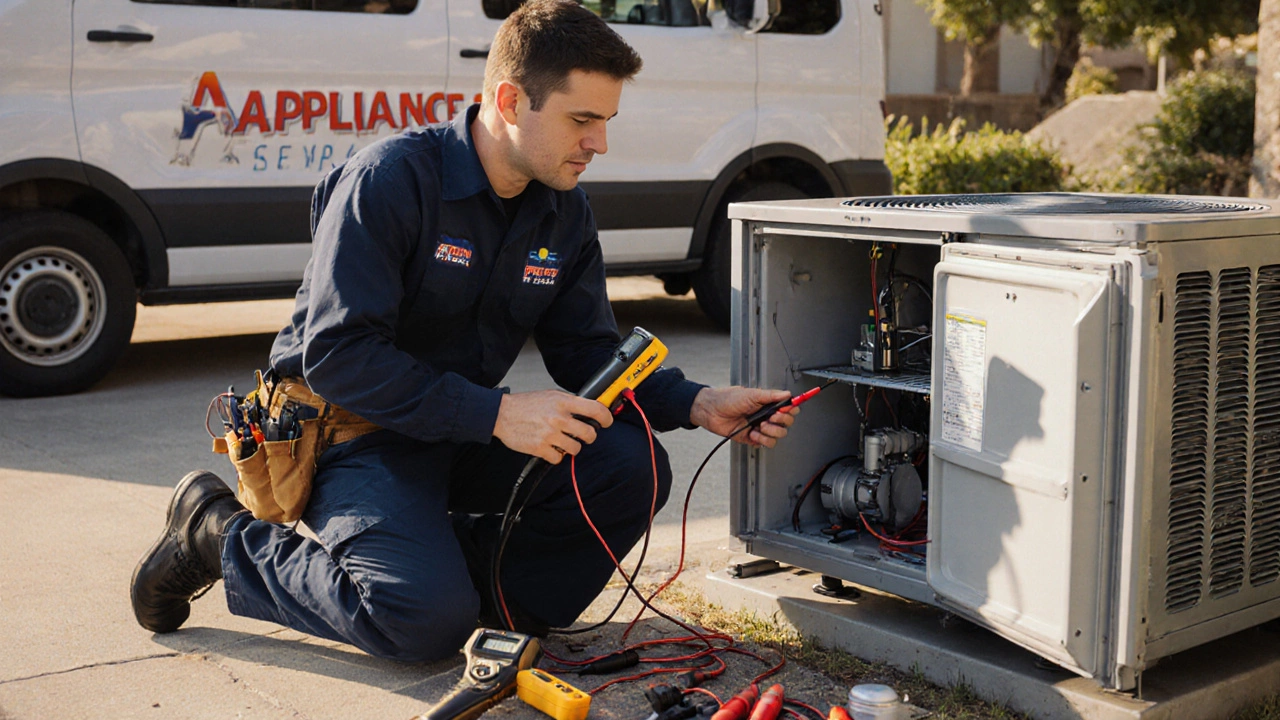Appliance Technician Salary Calculator
How This Calculator Works
Based on industry data from New Zealand and Australia, this tool estimates potential hourly wages for appliance technicians based on your experience level and certifications. Remember: actual pay varies by region, company size, and client demand.
Note: These figures represent typical rates based on industry data from New Zealand and Australia. Actual wages may vary based on location, company, and client demand.
When someone says appliance in a job context, they’re not talking about your fridge or washing machine. They’re talking about the person who fixes them. In the appliance service world, appliance is shorthand for appliance technician-the person who shows up at your door with tools, diagnostic gear, and a knack for knowing why your oven won’t heat or your dishwasher won’t drain.
Why the Term 'Appliance' Stuck Around
It started as slang. Back in the 1980s, repair shops in the U.S. and Australia began using "appliance" to refer to the techs who handled household machines. It was faster than saying "appliance repair technician" every time. Over time, it spread to service dispatch systems, job boards, and even internal team chats. Today, if you hear a dispatcher say, "Send appliance to the Henderson house," they don’t mean the fridge is going over there. They mean the person who fixes fridges.This isn’t just casual talk-it’s industry language. In New Zealand, where I’ve worked in appliance service for over 15 years, you’ll hear it in every call center, every repair log, and every technician’s radio. It’s efficient. It’s clear. And it cuts through the noise.
What an Appliance Actually Does on the Job
An appliance doesn’t just swap out a belt or reset a circuit board. Their job is a mix of detective work, electrical know-how, and customer service.- They diagnose problems using multimeters, thermal cameras, and manufacturer-specific software-like checking error codes on a Samsung washer or testing a gas valve on a Bosch oven.
- They carry inventory: door seals, thermostats, heating elements, control boards. Most don’t wait for parts to be shipped; they bring common ones in their van.
- They explain what went wrong in plain language. No jargon. Just: "Your dryer’s motor is overheating because the vent’s clogged. Let me clean it out and show you how to avoid this next time."
- They handle insurance claims, warranty validations, and safety certifications. If a gas appliance is involved, they must be licensed. In New Zealand, that means being registered with the Gas Safe Register.
It’s not just fixing machines. It’s restoring function, safety, and peace of mind.
How This Term Shows Up in Real Job Listings
If you search for appliance jobs on TradeMe, Seek, or local classifieds in Wellington, you’ll see postings like:- "Appliance needed for weekend callouts-must have experience with LG and Fisher & Paykel units."
- "Full-time appliance role: 50+ calls weekly. Van provided. Overtime available."
- "Entry-level appliance trainee-training provided. Must be reliable and punctual."
Notice how they don’t say "repair technician"? That’s because in this industry, "appliance" is the standard term. It’s understood. It’s efficient. And if you’re applying for these jobs, you need to speak the language.
What Happens When You Don’t Know the Lingo
I’ve seen new hires show up for their first day, confused because the supervisor said, "The appliance on the 12th street job called in sick." They looked around for a broken fridge. No one was there. Then they realized: "Appliance" meant the person. The tech had called in sick. That’s when it clicked.Not knowing the term isn’t just awkward-it can cost time, money, and trust. A customer who hears "We sent an appliance" might think you’re sending a machine. That’s a bad first impression. And in service work, trust is everything.

How This Term Compares to Other Industry Words
Different trades have their own shorthand:| Trade | Common Shorthand | What It Really Means |
|---|---|---|
| Appliance Repair | Appliance | Technician who fixes household machines |
| Plumbing | Plumber | Technician who fixes pipes, drains, water systems |
| Electrical | Electrician | Technician who handles wiring, panels, circuits |
| HVAC | Heating Tech | Technician who services furnaces, air conditioners |
| IT Support | Tech | Person who fixes computers or networks |
Each trade has its own term. But in appliance repair, "appliance" is unique. It’s not the tool, not the machine-it’s the person. That’s the nuance.
Why This Matters for Customers
When you call for help and the company says, "We’ve dispatched an appliance," you should feel confident. It means a trained, licensed professional is on the way-not a random guy with a screwdriver.It also means they’re prepared. Appliance technicians carry diagnostic tools, replacement parts, and safety gear. They’ve been trained on specific brands. They know how to handle gas leaks, electrical hazards, and water damage. This isn’t DIY territory. It’s skilled labor.
And in a world where so many services feel impersonal, the fact that an appliance shows up-on time, with the right tools, ready to fix your day-is worth something.
How to Get Started as an Appliance
If you’re thinking about becoming an appliance, here’s what you need:- Basic electrical and mechanical understanding-you don’t need an engineering degree, but you should know how circuits work and how to read schematics.
- Hands-on training. Many community colleges in New Zealand offer appliance repair certificates. Wellington City Council runs a free 8-week intro course each year.
- Tool kit. Start with a multimeter, screwdriver set, pliers, vacuum probe, and a good flashlight. You’ll add more as you specialize.
- Brand-specific certification. Fisher & Paykel, Samsung, LG, and Bosch all offer free online training for certified techs. It’s worth it-customers ask for it.
- Get licensed if you’re working with gas. In New Zealand, you need a Gas Fitter License from the Gas Safe Register. No exceptions.
Most technicians start as apprentices. You’ll work under someone for 6-12 months before going solo. Pay starts around $22/hour. After two years, you’re pulling $35-$45/hour. Some run their own businesses and make six figures.

Common Misconceptions
- "It’s just plug-and-play." No. Modern appliances have complex control boards, sensors, and software. A fridge with a bad inverter board can’t be fixed with a wrench.
- "Anyone can do it." Sure, you can YouTube how to replace a thermostat. But diagnosing a cascade failure across multiple systems? That’s expertise.
- "It’s a dead-end job." Wrong. Appliance techs are in high demand. With aging appliances and supply chain delays, repair is more valuable than ever. Many companies struggle to find qualified people.
What the Future Holds
Smart appliances are changing the game. Fridges that report their own faults. Washers that send error codes to your phone. This means appliance techs now need basic IT skills. They’re not just fixing hardware-they’re troubleshooting network connections, Wi-Fi modules, and cloud-synced diagnostics.Companies are hiring techs who can read app logs, reset Bluetooth pairing, and update firmware. If you’re starting out today, learning how to use the manufacturer’s diagnostic apps is as important as knowing how to test a heating element.
And with climate goals pushing people to repair instead of replace, the demand for skilled appliances is only growing. In 2025, New Zealand’s Ministry of Business, Innovation and Employment reported a 34% increase in appliance repair requests over the last three years. That’s not a trend. It’s a shift.
Final Thought
When you hear "appliance" in a job context, don’t think machine. Think person. Think skill. Think reliability. Think someone who shows up when your kitchen’s broken and your family’s hungry.It’s not glamorous. But it’s necessary. And in a world that’s always moving on to the next thing, the appliance? They’re the ones who keep the old things working.
Is 'appliance' the same as 'repair technician'?
Yes, in the appliance service industry, "appliance" is slang for "appliance repair technician." It’s shorthand used by dispatchers, companies, and techs themselves. When someone says, "Send the appliance," they mean the person who fixes your fridge, oven, or washer-not the machine itself.
Do I need certification to work as an appliance?
You don’t need a license for electric-only appliances like washing machines or dishwashers. But if you’re working on gas appliances-ovens, cooktops, boilers-you must be licensed under New Zealand’s Gas Safe Register. Most employers require at least a basic appliance repair certificate, and brand-specific certifications (like LG or Fisher & Paykel) make you more hireable.
Can I start as an appliance without experience?
Yes. Many companies hire entry-level assistants or trainees. You’ll start by shadowing experienced techs, handling parts, and doing basic diagnostics. Most offer paid on-the-job training. After 6-12 months, you’ll be working solo. The key is reliability, curiosity, and a willingness to learn.
Why are appliance jobs in demand right now?
Because people are choosing to repair instead of replace. With rising costs of new appliances and environmental pressure to reduce waste, repair is more popular than ever. In New Zealand, appliance repair requests rose 34% from 2022 to 2025. Skilled techs are in short supply, so companies are offering higher pay and better benefits to attract them.
What tools does an appliance need to start?
Start with a multimeter, screwdriver set, pliers, vacuum probe, flashlight, and a diagnostic app for common brands (Fisher & Paykel, Samsung, LG). Most employers provide vans and specialized tools. You’ll build your own kit over time as you specialize in certain types of appliances.
Is appliance repair a good long-term career?
Absolutely. Unlike many trades that are being automated, appliance repair requires human judgment, adaptability, and problem-solving. With smart appliances and repair-first policies, demand is growing. Many techs become business owners, work for themselves, or move into training roles. It’s stable, hands-on, and always needed.

